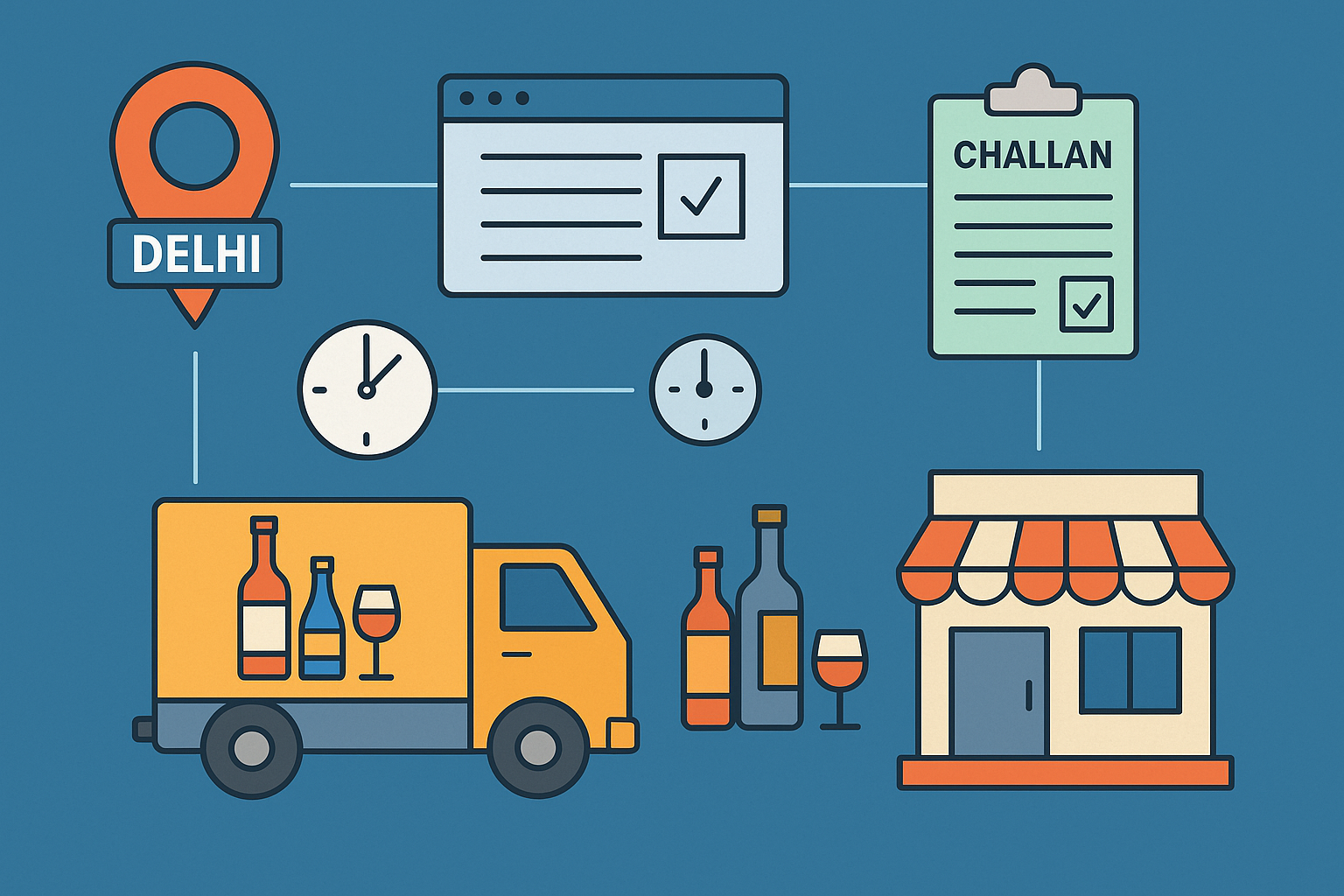Delhi Introduces Digital Liquor Delivery Challans to Streamline Alcohol Supply Chain
Delhi, India – In a major step toward digital governance and supply chain modernization, the Delhi government has launched an online delivery challan system and revised time-bound transport permits (TPs) to transform the city’s liquor distribution framework. Spearheaded by the Delhi Excise Department, this new initiative aims to enhance efficiency, transparency, and accountability in the supply of alcoholic beverages from wholesalers to retail outlets, hotels, clubs, and restaurants across the national capital.
This move is part of a broader policy shift aligning with India’s national digitalization goals and reflects the capital’s commitment to ease of doing business. It also marks a significant advancement from the traditionally manual, paper-based system that often caused delays, payment bottlenecks, and coordination issues between stakeholders.
What the Online Challan System Means for Liquor Supply in Delhi
Under the revised system, a digital challan will be generated through the e-Abakari platform immediately after liquor stock is delivered under a valid transport permit. This challan serves as an official proof of delivery for wholesalers and retailers alike—eliminating the previous requirement for physical signatures from vend receivers, which often delayed excise duty payments and complicated inventory tracking.
The Delhi Excise Department’s circular noted that dependence on physical documentation was a major obstacle to timely financial reconciliation. Retailers and government-run corporations, which manage liquor vends in Delhi under the current excise policy, are now required to accept these digital challans for accounting and verification.
“This initiative will significantly reduce friction in liquor supply operations, encouraging speed, transparency, and digital compliance,” said an official from the Delhi Excise Department.
Revised Transport Permit Timelines and Penalties for Delays
A new framework for time-bound transport permits went into effect on July 19, adding defined deadlines and penalties to the liquor ordering and delivery process. Here’s how the new system works:
- Purchase Orders: Retailers must place liquor orders with registered wholesalers through the e-Abakari system.
- Wholesaler Response Time: For Indian-made liquor, wholesalers must respond within 2 days. For foreign liquor, the deadline is 7 days.
- Mandatory Reason for Rejection: If wholesalers reject an order, they must provide valid reasons—improving transparency and traceability.
Once an order is accepted, wholesalers must ensure the liquor is delivered to the specified outlet by 10 PM the following day. Failure to deliver within this window renders the transport permit “expired unexecuted.”
To complete the delivery cycle, the system requires confirmation of stock receipt along with a submitted challan. Only upon this confirmation is the transaction marked as complete in the e-Abakari portal.
Penalty Structure to Enforce Compliance
To minimize delays and enforce strict adherence, a two-tier penalty structure has been introduced:
- First Delay: If a delivery isn’t completed on time, retailers can revalidate the expired TP the following day by paying 10% of the excise duty as a penalty.
- Second Failure: If the second attempt also fails, a 15% penalty on the excise duty is levied.
This structure aims to prevent delivery lags and promote punctual stock management—an essential requirement for high-demand locations such as hotels and clubs.
Boost to Transparency and Business Efficiency
The new digital system enhances end-to-end visibility in liquor transportation, helping both government officials and private operators track deliveries, audit movement, and manage inventory with real-time data. It also reduces paperwork, minimizes manual errors, and supports faster tax reconciliations.
By digitizing the process, the Delhi government has made strides in business process re-engineering (BPR), a key recommendation under the National e-Governance Plan (NeGP) by the Government of India. It complements other state-wide digital transformation initiatives such as digital property registration and e-challan enforcement for traffic violations.
Impact on the Liquor Retail Ecosystem
Delhi’s retail liquor sector is presently operated by four government corporations under the city’s excise policy. These corporations are now equipped to handle real-time tracking of orders, improved vendor coordination, and digital proof-of-receipt workflows, boosting retail efficiency.
The reform also holds significant implications for the hospitality sector, especially bars, clubs, and luxury hotels in the capital, where uninterrupted liquor supply is vital to operations and guest satisfaction.
Looking Ahead: A National Model for Excise Reforms?
The successful rollout and integration of this system in Delhi could set the stage for wider adoption across other Indian states, many of which still rely on manual liquor tracking systems. States like Maharashtra, Karnataka, and Telangana have expressed interest in similar reforms to curb excise duty leakage and improve transparency.
If scaled nationally, such digital reforms could contribute substantially to the Rs 2.5 lakh crore Indian liquor industry by enhancing efficiency, reducing black-market operations, and increasing tax compliance.
Conclusion
Delhi’s digital overhaul of its liquor distribution network through an online challan system and strict TP compliance is a landmark step in modernizing one of the most tightly regulated sectors in India. With benefits spanning faster stock replenishment, improved revenue collection, and seamless coordination between suppliers and retailers, the capital city has positioned itself as a model for progressive excise administration.
As these changes take effect, they not only serve local business interests but also reinforce Delhi’s reputation as a forward-thinking governance hub committed to leveraging technology for public and commercial benefit.
For more travel news like this, keep reading Global Travel Wire






















